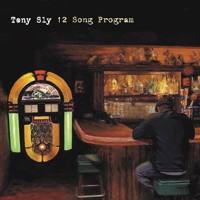
Tony Sly
12 Song Program (2010)
William_David
For Fat Wreck Chords fans of the late 1990s and early 2000s, both Lagwagon and No Use for a Name were undeniably two cornerstones of that movement, bringing great melodic punk to the scene one album after another. And arguably one of the top acoustic offerings from the punk community came from the frontmen of both bands getting together and stripping down their respective band's tunes (and the Caper rebuilding them with strings, piano and accordion), offering new insights into the melodies and (again arguably) producing some versions that even bested their originals. For my money, that split featuring a lone acoustic (yet stickered) guitar on the cover art was one of the best releases of 2004.
With Lagwagon's offerings being rather quiet since the 2005 release of Resolve, Joey Cape set out to release a solo album with Bridge, but it was hard to meet the album with little more than indifference. The melodies were, sad to say, a bit boring, and the arrangements just weren't getting it done. After a fairer yet still lukewarm reception to NUFAN's Feel Good Album of the Year, Tony Sly is out to try his hand at the solo gig with 12 Song Program.
Though an accordion appears on two tracks, some guitar and bass help is present, and even the Caper has a cameo on "Amends." Overall, though, Sly keeps it simple and melodic on his debut solo release. He opens things with a slow acoustic strum in "Capo, 4th Fret," singing a tale of drinking away loneliness, leading to the chorus: "Playing guitar and I'm forgetting words, like a baby who just learned to speak / Unfinished songs that I swear I'd get done, but the premise was just kind of weak."
It's a beautiful tune. It might not bring in new fans, but anyone who has enjoyed the Tony Sly school of melodic songwriting should feel right at home with this opener. It moves onto a faster track with the first accordion appearance on "Via Munich" before slowing down again for the reflective droll of "The Shortest Pier." This track, along with "Lovesick Love," underwhelm in some respects. They're not bad tunes, but do little more in terms of songwriting than trudge along the same path until completion. Certain elements also sound as if Sly could have gotten better recordings, but one can only assume they were left to feel a bit raw to aid the solo vibe.
But Sly shines on tracks like "Toaster in the Bathtub," where the lyrics really come to the forefront of the music to create great melody. It doesn't hurt that the track features an aggressive line of electric guitar chords to drive his voice to a more powerful place; "But we suffer from the same disease, and play each other's games / You're a day in the park. I'm the rain."
The appearance of Joey Cape on "Amends" helps it stand out as one of the best tracks on the album. Sly sets up the first few verses with his sound, then Cape comes in with his distinctive vocals for two lines before both men finish the verse together in great harmony. It's a great song, as well as a great moment between the two songwriters.
What may be the divisive element of 12 Song Program, though, is that for as much as there is here that sounds like the Tony Sly fans have come to know and love through NUFAN, he is also pulling influences from the likes of the Beatles. Whether those mesh well will largely be a matter of listener preference (I tend to think it works really well for some songs here, while a few can feel a bit dull).
It's also a much more personal album than political or social. 12 Song Program immediately calls to mind the 12-Step Program, and that's a matter of design. What Tony Sly has put together here is a bit of a concept album, arranged to tell a story, a progression of soul searching that carries through from start to finish. So while some tracks stand out more than others, what works best about 12 Song Program is its feel as an album.
The CD version comes in a digipak, featuring artwork by Mark Desavlo that calls to mind Edward Hopper's Nighthawks, only instead of a diner we see a man alone at a bar stool, a jukebox in the corner. The liners feature notebook-style lyric sheets. And that's how fans should buy it (or on vinyl). 12 Song Program isn't an album to be purchased piecemeal on iTunes, but rather to sit down and listen to from start to finish. It's in that setting that it succeeds most.